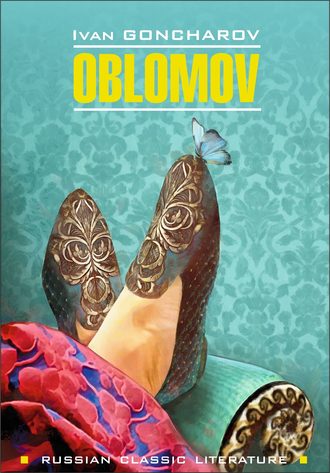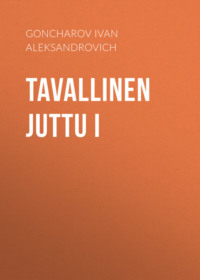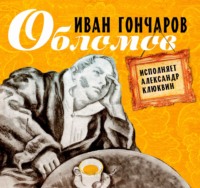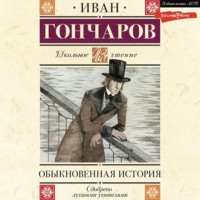
Полная версия
Oblomov / Обломов. Книга для чтения на английском языке
«In three weeks, sir? Why, sir, the agent says the workmen are coming in in a fortnight’s time. They’re going to break the whole place down. You’ll have to move to-morrow or the day after – that’s what he says, sir!»
«Does he? He’s in too much of a hurry! He wants us to move at once, does he? Don’t you dare even to mention the flat to me again. I’ve told you once before and you’re at it again. Take care!»
«But what am I to do, sir?» Zakhar asked.
«What are you to do? So that’s the way you want to wriggle out of your responsibilities?» replied Oblomov. «You’re asking me! What do I care? So long as you don’t bother me, you can make any arrangements you like, provided we haven’t got to move out of this flat! You won’t do anything for your master, will you?»
«But what can I do, sir?» – Zakhar began, speaking in a soft, hoarse voice. «It’s not my house, is it? How can we refuse to go, if we’re being chucked out? Now, if it was my house, sir, I’d have been only too glad…»
«Can’t you persuade them somehow? Tell them we’ve been here for years, always paid the rent regularly…»
«I told them that, sir».
«Oh? Well, what did they say?»
«Why, sir, what do you think they said? They just keep on saying we must move because they have to do all sorts of alterations. You see, sir, they want to convert this flat and the doctor’s next door into one big flat in time for the landlord’s son’s wedding».
«Goodness me, how do you like that?» Oblomov said with vexation. «To think that there are such donkeys who want to get married!»
He turned over on his back.
«Why don’t you write to the landlord, sir?» said Zakhar. «Perhaps he wouldn’t bother you then, but tell the workmen to break down the flat next door first».
Zakhar pointed somewhere to the right.
«Oh, very well, I’ll write as soon as I get up. You’d better go back to your room now, and I’ll think it over», he added. «It seems that you can’t do anything and I shall have to arrange this stupid affair myself too».
Zakhar went out of the room and Oblomov began thinking. But he could not make up his mind what he was to think of first: the bailiff’s letter, or moving out of the flat, or looking through the accounts. He was lost in a flood of worldly cares, and remained lying in bed, turning over from side to side. At times sudden cries were heard in the room: «Oh dear, oh dear! You can’t run away from life – it gets at you everywhere!»
It is difficult to say how long he would have remained in this state of indecision, if there had not been a ring at the front door.
«There’s someone at the door already», said Oblomov, wrapping his dressing-gown round him, «and I haven’t got up yet. Oh, it’s disgraceful! I wonder who it can be so early?»
And without attempting to get up, he looked curiously at the door.
2
A YOUNG MAN of twenty-five, looking the picture of health, with laughing cheeks, lips, and eyes, entered the room. It made one envious to look at him.
He was irreproachably groomed and dressed, and his countenance, linen, gloves, and frock-coat had a dazzling freshness. An elegant chain with numberless tiny trinkets stretched across his waistcoat. He pulled out a handkerchief of the finest lawn, inhaled the perfumes of the Orient, then, passing it lightly across his face and his shiny hat, flicked his patent leather boots with it.
«Oh, Volkov, how are you?» said Oblomov.
«How are you, Oblomov?» the dazzling gentleman said, walking up to him.
«Don’t come near me», Oblomov cried, «don’t come near me; you’re straight from the cold street!»
«Oh, you spoilt darling, you sybarite!» Volkov said, looking for a place to put down his hat, but, seeing the dust everywhere, he decided to keep it in his hand. He parted the skirts of his frock-coat to sit down, but after a careful glance at the armchair, remained standing.
«You aren’t up yet! What an old-fashioned dressing-gown you’re wearing – I haven’t seen one like it for ages!»
«It’s a perfectly good dressing-gown», said Oblomov, lovingly wrapping the wide folds of the garment round him.
«Are you well?» asked Volkov.
«Well? Good Lord, no!» Oblomov answered, yawning. «Couldn’t feel worse. High blood pressure, you know. And how are you?»
«Me? I’m all right. In perfect health, and having a jolly good time», the young man added with feeling.
«Where do you come from so early?» asked Oblomov.
«From my tailor’s. How do you like my frock-coat? Splendid, isn’t it?» he said, turning round before Oblomov.
«Splendid! In excellent taste», said Oblomov. «But why is it so wide at the back?»
«It’s a riding-coat; for riding on horseback».
«Oh, I see! But do you ride?»
«Of course I do! I had the coat specially made for to-day. It’s the first of May to-day: Goryunov and I are going to Yekaterinhof. Oh, you don’t know, do you? Misha Goryunov has received his commission – so we’re celebrating to-day», Volkov added with enthusiasm.
«Oh, indeed», said Oblomov.
«He has a chestnut horse», Volkov went on. «All the horses in his regiment are chestnut; and mine is a black one. How will you go – will you walk or drive?»
«Oh, I don’t think I’ll go at all», said Oblomov.
«Not go to Yekaterinhof on the first of May? Good Lord, Oblomov!» Volkov cried in surprise. «Why, everyone will be there!»
«Not everyone, surely», Oblomov observed lazily.
«Do come, my dear fellow! Sofya Nikolayevna and Lydia will be alone in the carriage, and the seat opposite is entirely at your disposal».
«No, that seat is too small for me. And, besides, what on earth am I going to do there?»
«Very well, in that case Misha could hire another horse for you».
«The things he thinks of!» Oblomov said, almost to himself. «Why are you so interested in the Goryunovs?»
«Oh!» Volkov said, flushing crimson. «Shall I tell you?»
«Do».
«You won’t tell anyone – on your word of honour?» Volkov went on, sitting down on the sofa beside him.
«I won't».
«I–I’m in love with Lydia», he whispered.
«Bravo! How long? – She’s very charming, I believe».
«For three weeks», Volkov said with a deep sigh. «And Misha is in love with Dashenka».
«Which Dashenka?»
«Where have you been, Oblomov? You don’t know Dashenka? Why, the whole town is crazy about her dancing. To-night I’m going to the ballet with him: he wants to throw a bouquet on to the stage. I must introduce him into society. He’s so shy – a novice. Oh, good Lord, I have got to go and buy some camelias».
«Whatever for? You’d better come and dine with me. We’d have a talk. I’m afraid two awful things have happened to me…»
«Sorry, I can’t. I’m dining at Prince Tyumenev’s. The Goryunovs will be there and she – my darling Lydia», he added in a whisper. «Why have you given up the prince? It’s such a gay house! So wealthy! And their country cottage! Buried in flowers! They’ve added a balcony to it – gothique. I understand they’re going to have dances there in the summer – tableaux vivants! You’ll be coming, won’t you?»
«No, I don’t think I will».
«Oh, what a splendid house! On their Wednesday at homes last winter there were never fewer than fifty people there – sometimes, indeed, there were as many as a hundred!»
«Good heavens, I can imagine how horribly boring it must have been».
«Boring! How can you say that? The more the merrier. Lydia, too, used to come, but I never noticed her there, then suddenly -
In vain to banish her from my mind I try,And by reason, my passion to tame» —he sang, and without thinking sat down in the arm-chair, but jumped up immediately and began dusting his clothes.
«How awfully dusty your room is!» he said.
«It’s all Zakhar’s fault!» Oblomov complained.
«Well, I must be off», said Volkov. «Must get those camelias for Misha’s bouquet. Au revoir».
«Come and have tea with me in the evening, after the ballet, and tell me all about it», Oblomov invited him.
«I’m sorry, I’ve promised to go to the Mussinskys’; it’s their At Home to-day. Won’t you come, too? I’ll introduce you».
«No, thank you. What should I do there?»
«At the Mussinskys’? Why, half the town is there! What should you do there? It’s a house where they talk about everything».
«That’s what I find so boring – talking about everything», said Oblomov.
«Well, why don’t you go to the Mezdrovs’?» Volkov interrupted him. «There they talk about one thing only – art. All you hear there is – the Venetian school, Bach and Beethoven, Leonardo da Vinci…»
«Always the same thing – how boring!» said Oblomov with a yawn. «Pedants, I suppose».
«There’s no pleasing you. Why, there are hundreds of houses you can go to. Everyone has definite visiting days now: the Savinovs have dinners on Thursdays, the Maklashins on Fridays, the Vyaznikovs on Sundays, Prince Tyumenev on Wednesdays. I’m engaged every day of the week», Volkov concluded with shining eyes.
«And don’t you find it exhausting to go rushing about day after day?»
«Exhausting? Good Lord, no! It’s great fun!» Volkov said happily. «In the morning I read the papers – one must be au courant with everything, know the news. Thank heavens my job in the Civil Service doesn’t require my presence at the office.
All I’m supposed to do is to have dinner twice a week with the head of my department. Then I go visiting people I haven’t seen some time – well, then – er – there’s always a new actress in the Russian or in the French theatre. The opera season will be opening soon and I shall book seats for it. And now I’m in love – summer is coming – Misha has been promised leave – we’ll go for a month to their estate for a change. We can do some shooting there. They have splendid neighbours who give bals champêtres. Lydia and I will go for walks in the woods, go boating, pick flowers – Oh!» and he spun round and round with delight. «However, I must be off. Good-bye», he said, trying in vain to have a good look at himself in the dusty mirror.
«Wait a moment», Oblomov tried to stop him. «I wanted to talk business with you».
«Sorry – I’m in a hurry», Volkov replied. «Another time! But won’t you come with me and have some oysters? You’ll be able to tell me all about it then. Come, Misha is treating us».
«No, thank you», said Oblomov.
«Good-bye, then».
He walked to the door and came back.
«Have you seen this?» he asked, showing him a hand in a marvellously fitting glove.
«What is it?» asked Oblomov, looking perplexed.
«The new lacets. You see how wonderfully they fit. You haven’t got to wrestle for two hours trying to button your glove. You just pull the lace and it’s done. It’s just arrived from Paris. Would you like me to bring you a pair to try?»
«All right, bring me a pair», said Oblomov.
«And have a look at this. Very charming, isn’t it?» he asked, picking out one of his trinkets. «A visiting-card with a corner turned down».
«Can’t make out the inscription».
«Pr. Prince M. Michel», Volkov said. «There was no room for the surname Tyumenev. He gave this to me instead of an Easter egg. – But good-bye – au revoir. I’ve another ten calls to make. Oh, how gay life is!»
And he vanished.
«Ten visits in one day – the poor wretch!» thought Oblomov. «And this is life!» he shrugged his shoulders. «What’s there left of the man? What is he wasting and frittering himself away for? No doubt it’s nice to look in at the theatre, and fall in love with some Lydia – she’s very charming! Pick flowers with her in the country, go shooting – there’s nothing wrong with that. But make ten calls in one day – poor wretch!» he concluded, turning over on his back, glad that he had no such empty thoughts and desires, that he did not rush about, but lay in bed, preserving his peace and his human dignity.
Another ring at the door interrupted his thoughts. A new visitor came in.
It was a man in a dark green frock-coat, with brass embossed buttons, his cleanly-shaven, worn-out face framed evenly by a pair of dark side-whiskers; he had tired, but calm and thoughtful, eyes, and a pensive smile.
«Good morning, Sudbinsky», Oblomov greeted him gaily. «So you’ve come at last to see your old colleague! Don’t come near – don’t come near – you’re straight from the cold street!»
«How are you, Oblomov? I’ve long been meaning to call on you», said the visitor, «but you know how devilishly busy I am. Look – I’m taking a caseful of official papers to the office to report on. And I’ve told the courier to come straight here if I should be asked for. I haven’t a moment to myself».
«You’re going to your office at this hour? Why so late?» asked Oblomov. «You used to be there at ten o’clock».
«I used to – yes. But now it’s different: I drive there at twelve». He emphasized the word «drive’.
„Oh, I see“, said Oblomov. „You’re head of a department! Since when?“
Sudbinsky nodded significantly.
„Since Easter“, he said. „But the amount of work – it’s dreadful! From eight to twelve at home, from twelve to five at the office, and more work in the evening. Never see anyone!“
„Well, well! Head of a department – so that’s it!“ said Oblomov. „Congratulations! What a fellow! And we used to be office clerks together. I shouldn’t be surprised if you were made a State Counsellor next year“.
„Good heavens, no. I should have been given the order of the Crown this year. I thought I’d receive an order for distinguished services – but now that I’ve been given my new post – you can’t be promoted twice in two years“.
„Come and have dinner with me; we’ll drink to your promotion“, said Oblomov.
„I’m sorry, but I’m dining with the vice-director to-day. I have to get my report ready for Thursday – hellish work! You can’t rely on the provincial reports. You have to check the lists yourself. Our vice-director is so particular, he insists on doing everything himself. So we shall sit down to it together after dinner“.
„Not after dinner, surely?“ asked Oblomov, incredulously.
„Why, what do you think? I’ll be lucky to get off early – I’ll have time to drive to Yekaterinhof. As a matter of fact, I came to ask if you wouldn’t go with me. I’d call for you“.
„I’m afraid I’m not feeling very well“, said Oblomov, frowning. „Besides, I’ve a lot to do – No, sorry, I can’t!“
„A pity“, said Sudbinsky. „It’s a lovely day. To-day is my only chance of getting some fresh air“.
„Well, any news at the office?“ asked Oblomov.
„Yes, all sorts of things. We don’t sign letters now, „Your humble servant“, but: „Accept our assurance of“. We’re no longer required to send in service lists in duplicate. Our department is to get three more sections and two more officials for special duties. Our committee has been closed. Lots of things!“
„Well, and what about our former colleagues?“
„Nothing special so far. Svinkin has lost a file of official documents“.
„No? What did the director do?“ Oblomov asked in a trembling voice. In spite of himself, he felt frightened from force of habit.
„He ordered to withhold his promotion till the file turns up. It’s an important case, concerning penalties. The director believes“, Sudbinsky added almost in a whisper, „that he has lost it on purpose“.
„I don’t believe it!“
„You’re quite right“, Sudbinsky affirmed importantly, with an air of condescension. „Svinkin is such a feather-brained fellow. He sometimes makes a mess of his figures and gets all his references muddled up. I’ve had such awful trouble with him, but I haven’t noticed anything of that kind – I mean, he wouldn’t do such a thing. He just wouldn’t. He must have mislaid the documents. They’ll turn up one day“.
„So that’s how you spend your time“, said Oblomov. „Always busy – working“.
„Oh, it’s dreadful, dreadful! But of course with a man like the vice-director of our department it’s a pleasure. He never fails to reward a good and conscientious official for faithful service, and he doesn’t forget those who don’t do any work, either. Those who have done their term of service he recommends for promotion; and for those who aren’t due for promotion or the conferment of an order he’ll try to get a bonus“.
„What salary do you get?“
„Oh, nothing much. One thousand two hundred salary, seven hundred and fifty for board, six hundred for lodgings, five hundred for travelling expenses, and up to a thousand in bonuses“.
„Good God!“ Oblomov exclaimed, jumping off the bed. „It isn’t singing you’re doing, is it? Why, you earn as much as an Italian opera singer!“
„Oh, that’s nothing! Peresvetov receives additional remuneration, and he does less work than I – and he can’t make head or tail of anything. But then of course he hasn’t the same reputation. They think very highly of me“, he added modestly, lowering his eyes. „The minister said the other day that I was a credit to the ministry“.
„Stout fellow!“ said Oblomov. „But working from eight to twelve, from twelve to five, and at home, too – well!“ He shook his head.
„But what should I do if I were not in the service?“ asked Sudbinsky.
„Lots of things! You could read, write..“. said Oblomov.
„But I do nothing but read and write now“.
„I don’t mean that. You could publish your writings“.
„Not everyone can be a writer. Look at you. You don’t write, do you?“ replied Sudbinsky.
„Ah, but I have an estate on my hands“, said Oblomov with a sigh. „I’m devising a new scheme, introducing all sorts of improvements. Worrying myself to death. But you’re doing other people’s work – not your own“.
„Well, that can’t be helped. One has to work, if one is paid. I’ll have a rest in the summer. My chief has promised to get me some special work which will take me out into the country. I’ll get travelling expenses to hire five horses, three roubles a day for my other expenses, and then promotion…“
„They have money to burn!“ Oblomov said enviously; then he sighed and fell into thought.
„I need money“, added Sudbinsky. „I’m getting married in the autumn“.
„Good Lord! Really? To whom?“ Oblomov cried sympathetically.
„Yes, indeed, to Miss Murashin.You remember they were staying next to me in the country during my summer holidays and had tea at my place? I believe you met her“.
„No, I don’t remember. Is she pretty?“ asked Oblomov.
„Yes, she’s a charming girl. If you like, we can go and have dinner with them“.
Oblomov looked embarrassed. „All right – only“ -
„Next week“, said Sudbinsky.
„Yes, yes, next week“, Oblomov agreed, feeling relieved. „My new suit isn’t ready yet. Tell me, is it a good match?“
„Oh yes, her father is a high-grade civil servant. He’s giving her ten thousand, and he has free Government quarters. He’s letting us have twelve rooms; furniture, heating, and lighting provided free. Not so bad“.
„Not so bad, indeed! You’re a lucky chap, Sudbinsky“, Oblomov added, not without envy.
„You must be my best man, Oblomov! Don’t forget“.
„Why, of course“, said Oblomov. „Well, and what about Kuznetzov, Vassilyev, Makhov?“
„Kuznetzov has been married for years, Makhov is now in my place, and Vassilyev has been transferred to Poland. Ivan Petrovich has received the Order of St Vladimir, and Oleshkin is „His Excellency“ now“.
„He’s a nice fellow“, said Oblomov.
„Yes, yes. He deserves it“.
„A very nice fellow indeed. Good-natured and even-tempered“.
„So obliging“, Sudbinsky added. „And, you know, never tries to curry favour, to make mischief, trip one up, get ahead of anyone – he does all he can for people“.
„An excellent fellow! I remember if I made a mess of some official report, left something out, expressed a wrong opinion, or quoted the wrong law in a memorandum, he didn’t mind; he’d merely tell someone else to put it right. An excellent fellow!“ Oblomov concluded.
„But our Semyon Semyonovich is incorrigible“, said Sudbinsky. „All he’s good for is to throw dust in people’s eyes. What do you think he did the other day? We received a demand from the provinces for putting up dog kennels near the buildings of our ministry, to guard against the depredation of Government property; our architect, a capable, experienced, and honest man, drew up a very moderate estimate; but Semyon Semyonovich thought it was too high and began making inquiries to find out how much the kennels would cost to build. He discovered someone who agreed to do it at thirty copecks less and at once sent in a memorandum about it…“
There was another ring at the front door.
„Good-bye“, said the civil servant. „I’m afraid I’ve been chatting too long to you. I may be wanted at the office…“
„Do stay a little longer“, Oblomov said, trying to detain him. „Besides, I’d like to ask your advice – two awful things have happened to me“.
„No, no, I’m sorry, old man, I’d better look you up again in a couple of days“, Sudbinsky said, leaving the room.
„My dear fellow, you’re up to your neck in it“, thought Oblomov, as he watched him go. „Blind, deaf, and dumb to everything else in the world. But he’ll be a big man one day, be put in charge of all sorts of important things, and reach a high rank in the service. This is what they call making a career, I suppose! But how little of the real man is wanted for such a career – intelligence, will, feelings are not wanted. What for? They’re a luxury! And so he’ll go on till he dies, and he’ll go through life without being aware of lots of things. And there he goes on working from twelve till five at his office and from eight till twelve at home – poor fellow!“
He felt a quiet satisfaction at the thought that he could stay in bed from nine till three and from eight till nine, and was proud that he had no reports to make nor papers to write and that there was ample scope both for his feelings and his imagination.
Oblomov was absorbed in his thoughts and did not notice a very thin dark man standing by his bed, a man whose face was practically invisible behind his whiskers, moustache, and imperial. He was dressed with studied negligence.
„Good morning, Oblomov!“
„Good morning, Penkin“, said Oblomov. „Don’t come near, don’t come near, you’re straight from the cold!“
„Oh, you funny fellow“, Penkin said. „Still the same incorrigible, care-free idler!“
„Yes, care-free!“ said Oblomov. „Let me show you the letter I received from my bailiff last night: I am racking my brains and you say: care-free! Where do you come from?“
„From a bookshop: I went to find out if the magazines were out. Have you read my article?“
„No“.
„I’ll send it to you. Read it“.
„What is it about?“ asked Oblomov, yawning heartily.
„About trade, the emancipation of women, the beautiful April weather we’ve been having, and about a newly invented fire extinguisher. How is it you don’t read the papers? Why, you find all about our daily life there. But most of all I’m agitating for the realistic movement in literature“.
„Have you plenty of work?“ asked Oblomov.
„Oh, quite a lot. Two articles a week for my paper, reviewing novels, and I’ve just written a short story“.
„What about?“
„About the mayor of a provincial town who boxes the ears of the local tradespeople“.
„Yes, that’s realism all right“, said Oblomov.
„Isn’t it?“ the literary gentleman said, looking pleased. „This is the main idea of my story and, mind you, I know7 it is new and daring. A traveller happened to sec the beating and he went and complained to the Governor about it. The Governor ordered a civil servant, who was going to the town on official business, to look into the matter and, generally, find out all he could about the mayor’s conduct and personality. The official called a meeting of the local tradespeople on the pretext of discussing their trade with them, and began questioning them about that, too. Well, what do you think those shopkeepers did? Why, they bowed and scraped and praised the mayor up to the skies. The official made some private inquiries and found that the trades“ men were awful rogues, sold rotten goods, gave short measure, cheated the Government, were utterly immoral, so that the beating was a well-deserved punishment!»
«So the mayor’s blows play the part of Fate in the ancient tragedies?» said Oblomov.
«Yes, indeed», Penkin was quick to agree. «You have a fine appreciation of literature, Oblomov. You ought to be a writer. You see, I’ve succeeded in showing up the mayor’s arbitrary disregard of the laws and the common people’s corrupt morals, the bad methods adopted by the subordinate officials, and the need for stern but legal measures. Don’t you think this idea of mine is – er – rather new?»












